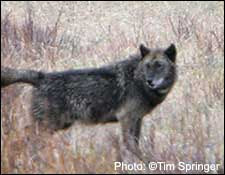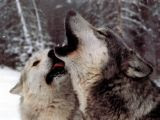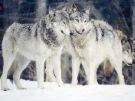" . . . From this hour onward, I would go open-minded into the lupine world and learn to see and know the wolves, not for what they were supposed to be but for what they actually were." - from Farley Mowat's "Never Cry Wolf"
Since it is National Wolf Awareness Week, I thought we could dedicate each day to learning more about the wolf. This, I feel, is a good way to honor them.
What do most people know about the wolf? Fact or fiction? This much is true: Most who love the wolf know its true nature and have a deep respect and awe for this sometimes mystical creature. Those who hate the wolf generally use the hate as an outlet for fear - of the unknown, as I have not encountered many wolf haters who actually know much about the true character of the wolf. Many of the misconceptions and misunderstandings then translate into obstacles in the survival and recovery of this maligned species.
So, who or what is the wolf? The wolf is an ancestor of our domestic canine friends. Wolves were the first dog, so to speak. Without wolves, we would not have "man's best friend". Dogs are direct descendants of the wolf. This is not myth.
Never in the history of the wolf has there ever been an attack on a human. This fact dates back to the 1800s when records started being kept. Healthy, wild wolves do not prey on humans nor do they harm or kill humans. In fact, they fear humans. And with good reason. There have been behavioral issues in wolf hybrids (dogs bred with wolves) due to genetic behavioral issues, but that is to be expected as this is not a recommended practice. So, no wolf attacks, hunting, or killing of humans. Unfortunately, we cannot say the same of our domesticated canine friends. In fact, millions of humans are attacked by so-called domesticated canines (dogs). This is fact.
"But they do hunt livestock and destroy the bottomline for farmers and cattle ranchers", you may say. Well, the last report that I can find with U.S. Fish and Wildlife Service with regard to the Northern Rockies is that wolves were responsible for only a mere 1.3% of sheep deaths and .03% of cattle from all causes, and .4% of sheep and 1% of cattle deaths due to predators. I don't know about you, but I happen to think these numbers are very small. So, what warrants the call for wolf slaughter to the point of extinction - - in the past or hopes of such a thing for the present? This brings me back to the idea that it is fear and misunderstanding.
To make matters worse - on the topic of wolves as predators and misgivings of farmers and cattle ranchers - is the fact that there are many precautions that can be taken to ensure the
safety and longevity of cattle/livestock. The list of methods is long, but it includes: rotating and guarding herds, keeping livestock away from wolf denning and meeting sites, staying vigilant concerning the removal of dead livestock from fields so that wolves don't feel invited to the area for dinner, and the use of fladry. (Fladry - A string of flags used to contain or exclude wild animals. Also attributively: fladry line, fladry barrier. ) Incidentally, it has been reported that wolves would rather attempt to run with the helicopters rather than cross the line of fladry. In my quest to provide you with some facts concerning our wolf friends, I also came across something known as the Wolf Guardian Program. This program pays people to camp in wolf country to "keep watch" over livestock. For the wolf enthusiast and avid photographer, this sounds like a great job!
Another often not mentioned fact is that farmers and cattle ranchers are compensated for their losses. In fact, Defenders of Wildlife has spent in excess of $280,000.00 since the late '80s to compensate ranchers for confirmed wolf-related losses of livestock.
While we are on the subject of dinner bells being rung, this is a good place to offer another fact concerning wolves. They often seek out and eat dead carcasses. Even though the wolf is strong and powerful, it is difficult for them to eat anything that is not weak (near death and dying already) or simply dead. So, do wolves reduce populations of animals for humans to hunt? Not likely. In fact, Minnesota had its highest record deer harvests while supporting about 200o wolves. If "big game" numbers are truly on the decline, there are numerous factors and conditions to consider. Factors contributing to the decline of "big game" include parasite outbreaks and disease, harsh winter weather, and traffic, just to name a few. Wolves are actually responsible for very few deaths. Where there are larger populations of wolves, wildlife have had to become more proactive and vigilant in their survival (they move around often and do not stay in the same place for long), and this survival behavior may have caused hunters to ascertain that since there are more wolves, that must be the reason they are not seeing "big game" where they used to, are seeing fewer of the animals they enjoy hunting, or are not seeing them at all, as they once did. This can indeed make hunting more challenging, but the animals being hunted are still there. Hunters just need to look harder.
That concludes today's wolf facts. Until next time, don't forget that we need to Save The Wolves Now!





No comments:
Post a Comment